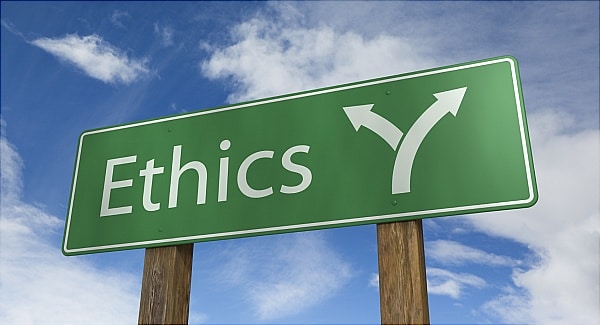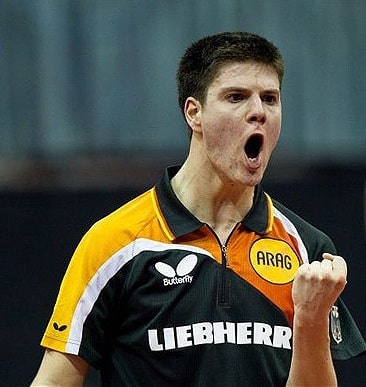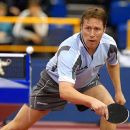What kind of a player are you? Do you play by the book, or do you pull out every trick in your sleeve to win, even if that means not being very ethical?

It doesn’t often happen and usually not by high-level players, but it does happen, and it has happened to me a few times. While I’m in the middle of a match and things are looking good for me to win… something happens all of a sudden, or sometimes its that way from the beginning of the game:
- The opponent starts limping after every point.
- The opponent is holding his leg or arm in agonizing pain.
- The opponent is looking out of breath losing consciousness.
- The opponent goes into a fit about… someone in the audience talking, the floor is dirty, the sunlight coming in from the non-existent window, etc.
- The tears coming down on the opponent’s cheeks as he is waiting for me to serve.
- The opponent is having some imaginary problems with his paddle.
- The opponent yells CHO in every single point, even if you miss a serve.
- The opponent delaying you from serving by jumping up and down, walking around, or not being in a ready position in time.
And so many other tricks that I can’t even bother to remember.
In some of these cases, the opponent even contemplates quitting the game at some point, but somehow they never do. What’s even crazier is that they continue to play as if nothing happened, and they are even better than before the “incident.”
Even though I realize that it’s all an act, it still throws me off. There is no way I can play the next point, ignoring what just happened. I do lose my concentration, and I struggle to get the whole scene out of my mind. As a result, I find myself struggling through a match that looked like a cakewalk.
I can’t think of any training method to master insensitivity and be able to go through matches like this without a stumble.
I wonder why opponents create all these “weird actions” because they try to get some time to adjust their momentum and calm down their minds. And the other thing is trying to get sympathy from the opponent, so they hope that the opponents can “leniently” lose some points.
For me, this is frustrating and annoying. It affects my focus while playing in the match, and it can confuse me. I immediately lose all my respect for the opponents if they show all these funny actions right in front of me when we compete.
Has this happened to you? Are you using these kinds of tactics? I would love to hear your take on this.
Is ‘Cho-ing’ Becoming Excessive?
Hi all! It is all about sportsmanship in table tennis, particularly the growing trend of ‘Cho-ing’ after every point! Of course, a monotone silence shouldn’t fill the playing arena, but is the shouting becoming a little excessive?
Firstly, I’m going to look at why this is becoming such a sensation. In a tight match, emotions run high, and a certain degree of fist-pumping and vocalism is expected. Depending on the person, a good shout can get you fired-up, while for others, cool and collected is the way forward.

Secondly, are these shouts purely to motivate yourself, or do some players aim at intimidating the opponent? Well, the answer is pretty straightforward. You must have seen that guy – there’s always one – that accompanies the ‘cho’ with a long-lasting Basilisk stare.
To me, at least, that’s an awful diversion from the game, as it just suggests that table tennis is a game of intimidation. There’s further evidence of intimidation in junior tournaments that I’ve attended. The kids have been encouraged to shout after every point, even if they’re one of those who prefer to be calm and concentrated.
Harimoto the good example
Harimoto Tomokazu is a player from Japan who is very good at Cho-ing. Almost after every score, he will cho out loud. We can see the high spirit that he has for each game that he plays. But many audiences feel that it this annoying listening to such loud noises coming out of his mouth.
However, we did know that Harimoto Tomokazu is a player with good behavior and good ethics. The Cho-ing is too much, which frustrates some people. It is his style, but I think he needs to reduce such attention to have a better entertaining moment by enjoying watching the match.
This other one I’ve seen violated at several tournaments. When you win a point on a net or an edge, or when your opponent mid-serves, it’s etiquette not to celebrate. It’s often the coaches or support that breaks this one, but it isn’t a good image for the sport.
In conclusion, I’d say that there’s absolutely nothing wrong with shouting or motivating yourself after a big point (either in terms of standard or significance). Still, for me doing it after each point is unnecessary, as it can also disrupt other games going on around you if it’s a tournament situation. It should only be done for self-motivation purposes, not to hinder others.

Warren Davies
Hi, I’m Warren Davies, a table tennis addict who loves sharing tips, reviews, and everything you need to level up your game. I’ve spent years playing, testing gear, and geeking out over the sport, and I’m here to make things simple and fun for players of all levels. When I’m not writing, you’ll probably find me perfecting my forehand or trying out the latest paddle.









8 thoughts on “Game Ethics of Playing The Table Tennis Sport”
Interesting topic! Did you really encountered an opponent who faked an injury? That’s ridiculous…
I dont think there is a training method that you can focus on because these kind of players have great variety on how they annoy you. So players who use “unethical” tricks can be confronted with one way only. And this is by doing your personal “tricks” not just to annoy them back, but to calm yourself down and find your mindset/focus again
What i did and it worked is to focus on MY game regardless of the score,opponent, field, situation or mine/his emotions. Today at practice I had problems with receiving a specific sidetopspin serve and after some consecutive lost points, my opponent didnt stop in between the points and he literally run over me because I couldnt cope with the pace, thinking the same things like you. After taking a towel break I calmed down and started playing/receiving better.
Now in official matches you cant always have a towel break or timeout so I use some “tricks” I have learned from a coach when I was a teenager (it happens to be your mother hehe).
1. Shoelaces. You pretend that they need adjustments so you can untie/tie them again quickly and start talking to yourself to calm down
2. Sweat. Once again pretend that there is too much sweat on the paddle or your handle and start cleaning it slowly
3. If the ball travels long, walk slowly to pick it up and dont rush to serve or give it back, take some breaths first
And finally the old time classic “hand cleaning the table” which many professionals use inbetween points. I have seen many pros do it even at the very first points of the match, when obviously their hand has no sweat at all. Most of them do it to slow their opponent down, especially if they are on a winning streak.
Finally, I believe that a good method is to play some practice matches or even official ones and focus not on winning but keeping a balanced mindset throughout the game. Its not easy at all, but match after match you will learn to get yourself back on track no matter the situation. It worked fine for me, I lost some league matches last year (matches that I could have won) because my focus was on controlling myself not on winning.
But in the long run, it made me a better player this year and I hope I will get much better in the following years.
Hope I helped
Thank you this post. I play recreationally at work, one person is blatant about getting an edge by serving the ball before the opponent is ready to receive (ie just as the receiver arrives at the table after picking up a ball). Another trick he does is distract the receiver by asking “what’s the score?” or announces the score as he is serving the ball. I never thought much about it calling him out on this because the games are just for fun. To counter his tactics I just walk to the table first before double bouncing the ball back to him. If he talks as he serves I dont return the serve (unless it’s an easy one for me to start the attack), stop play and say back to him “I dunno, let me think for a sec” or “what did you say the score is?”
@George: Actually yes, once I was playing with a guy and he was wearing that huge knee thing to hold his knee together.But he was playing just fine for the whole match and then out of the sudden towards the end he fell on the floor holding his knee in pain, then he started limping to go get the ball… I was looking at him in shock! And then he serves like nothing happened, haha I just couldn’t get over it, for a few I was trying to not make him run for the shots…but in the end I thought to myself ” if he is in that much pain he should stop, he isn’t stopping so it probably isn’t that bad” and I played my usual game and won.
Thanks for the tips, I especially love the cleaning the table one, reminds me of my mom she used to do it all the time.
Great topic to talk about, I have seen some tips here, that I think I will use next time.
My personal experience with these things really differs each time. I do get annoyed by some people and their actions, but that helps me motivate, concentrate and play better to defeat the opponent who is using these “unethical” tricks.
When some people take a lot of time before they serve/receive, I will play along and use that time to think about a strategy, take a breath and concentrate again. That really helped me to keep going on and see how ridiculous my opponent is, making it easier to ignore their actions and focus on the game itself.
I do want to point out that it is something different if the opponent of the player whom you coach is doing that. Trainers and coaches and parents from youth players can and should be held responsible for playing “unethical”. Fair play is very important in every environment and competition is to see who has the best skills, not who is the most annoying. I did have to warn some (youth) players and even coaches and parents, when not playing fair. I think everyone has had the experience once, that your opponent receives advice during the match, or the coach is clapping after each point way to long or to hard.
At the end with some you can just communicate to have a fair play environment and everything will be allright. Unfortunately there will always be a few, whom are looking to annoy you, because that is their game. It is best to ignore them and keeping focusing on yourself, since every match is a way to test yourself, whether it may be a test in skill, a test of patience or both.
I have to agree with Ronald Silva that when this unethical behavior is coming from a coach or a parent from the sidelines that’s totally unacceptable. The thing is that even if you stop and call them out on it and set things straight, they already have accomplish their goal which was to take your concentration from the game.
Yes that could be true, Leanna, their goal will probably be accomplished by then. Talking to one another and warning them is more about improving a fair play sporting environment on the long term then winning the game at the moment. I personally give tips and warnings to the players I coach to ignore it and giving them assignments on what to focus on. By focusing them on what to do, children usually ignore the rest around them.
And Leanna, thank your response.
This is a very good topic… I like the cagey or foxy players, usually the older player. When they are losing, half way through a match they start complimenting you on your shots by saying ” great shot ” ” to good ” etc, they keep this up, between points up until they are winning…. Show NO MERCY, other wise you will walk away a LOOSER. Play each point as you would in a normal game. Then afterwards thank you opponent for their support during the match.. 🙂
Agree with Douglas, you have to show no sympathy and no mercy, this is the only way to maintain your focus. If you let them distract you with their show of bad ethics then you are allowing your concentration to fall away from the game. So as I like to, take a stone cold approach. If they are faking an injury then exploit it, perhaps they are pretending to have a sore knee, hit the ball wide and make them move more. If the injury is real and serious they will pull out of the game, if it’s fake then by not moving or pretending to be incapacitated is now their disadvantage instead of their advantage.
I’m not a fan of players like this either but in fairness they are handing me an easier win by not being 100% focused on winning so in some ways you can come to appreciate it 😛